Finn Church Aid (FCA) embarks on a transformation journey by making an organisational renewal to better serve the world’s most vulnerable populations.
The renewal answers to the needs of the changing world. The work of FCA is affected by, among other things, climate change, changes in global power structures, decrease in empathy, digitalisation, urbanisation and the changes in the financial structure for development cooperation and reductions in funding.
“There is a continued need to have actors amplifying the voices of the most vulnerable. We need to remain able to function amidst these changes in order to deliver aid effectively also in the future,” says Executive Director Jouni Hemberg.
FCA is making its leadership structure more effective and transfers decision-making to the local level in Asia, Africa and the Middle East. The organisation’s global decision-making will be strengthened by appointing two representatives from FCA’s country offices to the Global Leadership Team, which will have a significant role in strategic decision-making. The new organisational structure aims to serve better the people FCA works with and emphasis accountability.
There are also new positions in FCA. PhdEd Tomi Järvinen, formerly Director of International Cooperation, is appointed as Deputy Executive Director of FCA to lead strategic planning. FCA’s former country director for Cambodia Saara Lehmuskoski, M.Soc.Sc., is appointed as Head of Transformation and Katri Suomi, MA, MSc, as Director of Stakeholder Relations.
The new organisational structure will come into force on 1st April and the implementation will continue over the coming months.

1. Donation: The blockchain creates a reference for each donation. The reference allows users to track exactly how their donation is used.

2. Beneficiary registration: Blockchain technology enables electronic registration of beneficiaries, for instance, biometrically through fingerprint or iris scans or with smart cards.

3. Verified retailers: Retailers of food and other necessities are equipped with the relevant technology for identifying beneficiaries and trained in using the system.

4. Redemption: The retailer receives payment from the NGO that coordinates the operation for the items they have sold to identified beneficiaries.

5. Monitoring: If transactions are made electronically, the smart contract enables the donor to follow up on how the beneficiary spends the assistance in real-time through an online link.
The benefits and challenges of cash assistance
Cash transfers are one way to ensure that a greater amount of assistance funds directly reaches those in need while also enabling vulnerable families to decide for themselves what they need and prioritise their procurements. Local retailers benefit from increased activity at local markets.
Distributing cash does also bring challenges. The beneficiary is subject to risks by carrying relatively large amounts of cash in a fragile context. To ensure that the money does not instigate fraud or corruption, organisations need to allocate staff for monitoring and follow-ups.
The spread of the coronavirus has also complicated arrangements of cash distributions, and the use of cash increases the risk of transmitting the virus between people at local markets.
With the support of blockchain technology, an organisation can create a virtual wallet for each beneficiary. The beneficiary can then buy necessities from verified retailers equipped with the appropriate identification equipment. Transactions are followed virtually, making monitoring easy, and the blockchain enables safer transactions that protect the identity of the beneficiaries.
Text: Erik Nyström
Illustrations: Tuukka Rantala
The board of Finn Church Aid has named Katri Suomi as Director of Stakeholder Relations Department from 1st March 2021. Suomi holds Master of Arts degree in Political Studies and Master of Science degree in International Environmental Science.
The position is new. The responsibilities of the department include advocacy, communications, and church and ecumenical relations and other international partnerships.
‘Cooperation with different stakeholders and efficient and timely communications and advocacy are all the more important for Finn Church Aid and so we happy to have Katri Suomi leading this important work. We warmly welcome her to this new position,’ says Jouni Hemberg, Executive Director of Finn Church Aid.
Katri Suomi has worked in different positions in Finn Church Aid since 2008. She has been, for example, Head of Advocacy and Global Ecumenical Relations and Climate Change Adviser. Earlier Suomi has worked, among other things, in the Finnish Ministry of the Environment and in Finland’s Permanent Representation to the European Union.
‘The appointment is both a joy and an honour. I look forward to developing and strengthening stakeholder relations at Finn Church Aid together with my skilled and committed colleagues,’ Suomi says.
FCA has decided to change its operation to better answer to future challenges. There will be communication during this spring about other changes in the work and organisation of Finn Church Aid.
‘Achieving the sustainable development goals requires wide-spread cooperation with different stakeholders. – The COVID-19 pandemic has affected the earlier development results and the situation has worsened in several of FCAs countries of operation with regard for example to gender equality, education and livelihoods. In this situation, it is even more important to bring advocacy, communications, church and ecumenical relations, and international partnerships into one unit. It makes it stronger and enables better and more efficient work with stakeholders,’ Katri Suomi notes.
Ms. Tarja Kantola, Chair of Finn Church Aid’s Board of Directors, has been appointed to co-chair the Faith-Based Advisory Council for the United Nations Interagency Task Force on Religion and Development. The other co-chair for the Council is H.E. Faisal Bin Muaammar, Secretary General of King Abdullah bin Abdulaziz International Center for Interreligious and Intercultural Dialogue (KAICIID).
“As co-chair of the Advisory Council, I look forward to the opportunity to advance human rights and build upon the experience of faith-based organisations with the UN”, says Ms. Kantola.
The UN Interagency Task Force was formed in 2010 as a mechanism to generate more learned and systematic knowledge about faith-based engagement around the development, peace building and human rights’ agendas of the United Nations. In April 2018, the UN Task Force and over 50 of the faith-based NGO partners agreed to develop an Advisory Council.
The responsibility of the Advisory Council will be to provide strategic advice to the UN Inter-Agency Task Force in order to strengthen human rights-based policy advocacy, coordinate engagement with faith-based entities, and to focus on the representation of religion in peacemaking.
In celebration of Mr. Annan’s legacy of engaging with faith-based actors, the Task Force will launch an Annual Kofi Annan Faith Briefings’, which will uphold the importance of strategic partnerships by the UN system with faith-based civil society actors around the world.
“Finn Church Aid and the Network for Religious and Traditional Peacemakers applaud the efforts of the Inter-Agency Task Force on Religion and Development. It is a significant development to see this effort being institutionalised through the first-ever Advisory Council of faith-based organisations. It is a tremendous recognition to Finn Church Aid’s thematic work to have its chair, Ms. Tarja Kantola, as the co-chair the Advisory Council”, states Dr. Mohamed Elsanousi, Executive Director of the Network for Religious and Traditional Peacemakers and Advisory Council member.
Ms. Tarja Kantola has an extensive career in international relations and promoting human rights. She is Member of the Church Council of the The Evangelical Lutheran Church of Finland and Chair of Board of WISE Wider Security Network. Prior to serving as Chair of Finn Church Aid’s Board of Directors, she worked for the Ministry for Foreign Affairs of Finland as political Advisor in Foreign Ministers Cabinet with four Foreign Ministers and chaired the Advisory Board on International Human Rights Affairs set by the Finnish Government. Kantola has also worked with several civil society organisations, including the International Solidarity Foundation, the Finnish Refugee Council and Save the Children Finland. She has been Member of the City Council of Helsinki and Member of the City Board.
For more information
Ms. Tarja Kantola, Chair of Board, Finn Church Aid
tel.+358 050 555 0833, kantolantarja(a)gmail.com (Time zone GMT +3, Eastern European Summer Time)
Dr. Mohamed Elsanousi, Executive Director, The Network for Religious and Traditional Peacemakers
tel. +1 317 506 2835 (Time zone GMT-4, Eastern Daylight Time)
finnchurchaid.fi
peacemakersnetwork.org
Finn Church Aid (FCA) has become a globally valued expert in education and peace work. At the end of September, the 70 years of FCA’s aid work were celebrated in Helsinki.
FCA’s anniversary year culminated in the #courage2017 seminar held in Helsinki on 27 September. Among the speakers were Finnish Prime Minister Juha Sipilä, Archbishop of Finland Kari Mäkinen, the UN Under-Secretary General and Special Adviser on the Prevention of Genocide Adama Dieng, and Alice P. Albright, the Director of the Global Partnership for Education (GPE), which is the world’s most important funder of education in developing countries.
“It is admirable, that despite the risks, Finn Church Aid has decided to work in the world’s most fragile countries”, Prime Minister Sipilä said in his speech.
The Prime Minister commended FCA’s practical work in peace mediation and in the fight against violent extremist groups, as well as its courage to open-mindedly try out new methods and partnerships.
“My office receives some of its greatest support from civil society actors like Finn Church Aid”, said UN Special Adviser on the Prevention of Genocide Adama Dieng.
Partnership with Finn Church Aid, and the Network for Religious and Traditional Peacemakers working in connection with it, has led to concrete results.
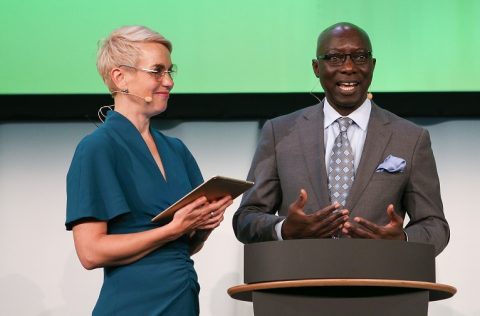
UN Special Adviser Adama Dieng answered questions from the audience. The seminar was hosted by Baba Lybeck.
“At the heart of all religions is the belief in our common humanity and respect for others. Together we have succeeded in placing a discussion about the positive power of religion at the heart of the work of the United Nations”, Dieng said.
The importance of education was a recurring theme in the event’s speeches. According to the latest estimates, there are 264 million out-of-school children and youth in the world.
“Hundreds of millions of young people are being left behind. They will never acquire the skills they need to break out of poverty or to compete in an increasingly globalised world. The countries they live in are deprived of their input in the building of economically stable and sustainable societies. As a result, we are all less well off”, said GPE’s Director Alice P. Albright. GPE is working to improve education in developing countries.
Albright reminded the audience that we live in an increasingly interconnected world, and inequality of opportunity leads to discontent and conflict, which in turn can spill over national borders. It is the responsibility of everyone – whether from traditional donor countries, emerging economies, developing countries, foundations, civil society or the private sector – to invest in education.
New direction and a wider reach
Ten years ago, Finn Church Aid completely changed its direction. Where earlier FCA had focused on funding the work carried out by its partner organisations it now decided to specialise in peace work, education and improving livelihoods. It also began sending its own relief workers abroad and set up country offices to manage the implementation of its own projects.
“We wanted to take a bigger responsibility for the results of our work. On a global scale we are a small organisation and it is not sensible for us to seek out projects in areas that already have a large number of actors in them. Our work has its biggest impact in the world’s most fragile countries”, says FCA Director Jouni Hemberg.
In ten year, FCA’s income has doubled, partly as a result of international funding. FCA currently employs 350 people, which is nearly ten times more than a decade ago. Last year, 132,500 children and youth received access to education as a result of FCA’s work.
Among the guests at the anniversary event were representatives from FCA’s Finnish and foreign partners, the Finnish government, the Finnish church, other civil society organisations, the media and parishes.
Deaconess Heidi Karvonen from Oulu has been FCA’s contact point in her parish for 20 years.
“International charity work is important for me and I have always wanted to bring FCA’s work forward in my parish. Initially, disaster relief was closest to my heart, but now I feel most strongly about peace work, about how conflict and human suffering could be avoided. At the event today, we’ve heard a lot of emphasis put on the importance of education as the foundation for peace work”, Karvonen says.
“Finn Church Aid’s courage is a result of it recognising its roots and identity and drawing from them”, said Archbishop Kari Mäkinen.
The Archbishop spoke of how after the Second World War, churches understood that they were part of a reality in which people’s basic security had been shaken. Talk of a loving God rang hollow when people were not fed, clothed or cared for. The foundation of the churches’ work was the principle of mutual dependence and reciprocity. God’s world is one; its hope and despair are common to us all.
“This courage is needed now as Finn Church Aid works around the world from Central Africa to South Sudan, from Syria to Nepal and Europe. The vulnerable must be protected, the hopeless must be afforded hope, peace must be brought to places of violence.”
The theme for FCA’s anniversary is #courage2017.
In the 70 years worship preceding the seminar, the World Council of Churches General Secretary Olav Fykse Tveit thanked FCA for its contribution in the ecumenical movement. In his sermon Tveit said: ”We live in a world that is getting divided, polarized, focusing on the differences and the dividing forces between us as human beings and between us and nature. We need the courage to live with a vision for unity.”
Finn Church Aid’s (FCA) work in the world’s most fragile states brings significant results in all areas of operation. The results are published in FCA’s annual report 2016.
FCA is an established actor within the education sector, specialised in securing education for everyone, building learning spaces after disasters and enhancing the level of education.
“2016 was a challenging year for us, but we achieved remarkable results in all areas of our work. Especially our work with quality education grew significantly. This is very important now that less and less global aid is allocated to education”, says FCA’s Executive Director Jouni Hemberg.
The decreasing share of funding to education puts other development goals at risk, according to the U.N. Aid allocations to education are falling for the sixth year in a row and last year education received only 2.7 per cent of total aid available.
Despite the overall trend, FCA doubled the amount of its education projects in 2016 with the aim of increasing access to quality education for children and youth.
The achievements include the incorporation of career counselling into Cambodia’s national curriculum and the construction of hundreds of learning spaces in Nepal, where FCA is the second biggest international organisation to reconstruct earthquake-damaged schools. Last year FCA’s work resulted in access to education for 63 000 children in the Central African Republic.
A total of 132 000 children and youth benefited from FCA’s education projects in 2016 and 4 693 teachers took part in trainings in program countries.
Last year was also marked by budget cuts when the Finnish government’s decision to reduce funding for development cooperation came into force. FCA’s government funding was reduced from 15,5 million euros to 8,3 million. However, FCA continued to see positive development in the cooperation with international donors , and the international funding exceeded that of the state. Private and corporate donations exceeded targets for 2016.
In 2016 FCA’s expenditures were 34,7 million euro, of which 29,1 million was allocated to international aid. FCA is Finland’s largest organization in development cooperation and second largest in humanitarian aid. FCA is specialised in three themes: quality education, sustainable livelihoods and peace.
The work for sustainable livelihoods reached impressive results for instance in Nepal where 98 percent of families participating in women’s entrepreneurship programme have risen past the poverty line at the conclusion of the programme. In South Sudan local peace agreements were signed among stakeholders within Boma state and between Boma and Jonglei states, and over 90 percent of participants expressed their satisfaction in the process supported by FCA.
FCA works for peace in Finland. Since last autumn the project Reach Out supports religious communities in their grassroots level work against prejudice and hate speech.
Finn Church Aid Annual Report 2016 (pdf)
More information:
Jouni Hemberg, Executive Director for Finn Church Aid, p. +358 50 325 9579
jouni.hemberg(a)kirkonulkomaanapu.fi
Mikko Koivumaa, Head of Communications, p. +358 40 559 4030
mikko.koivumaa(a)kirkonulkomaanapu.fi
A vehicle belonging to a national non-governmental organisation fell into a deadly ambush on its way to Pibor in South Sudan on Saturday 25th of March. The incident is a grave attack against aid workers causing calls for investigation.
Six staff members of the South Sudanese humanitarian aid agency GREDO were reportedly killed when their vehicle fell into an ambush last Saturday. The incident occurred in the early morning hours on the road leading from the capital Juba to Pibor town, which is approximately 250 kilometres away.
The aid workers were traveling in a convoy when the attack happened. The bodies of the aid workers were found on the road by the convoy members who reached the area after some time.
GREDO has been a partner to Finn Church Aid in South Sudan since 2016. Together the two organisations have supported sports for peace activities for the youth in Pibor and its neighbouring counties with the aim of increasing peaceful co-existence and unity among them.
“I’m aghast and infuriated by the despicable murder of six courageous humanitarian colleagues”, says Pio Ding, FCA’s Country Director from Juba.
“This is particularly tragic at a time when humanitarian needs have reached unprecedented levels. It is entirely unacceptable that those who are trying to help are being attacked and killed. We urge the authorities to investigate and bring the killer to justice.”
The convoy, which included several vehicles and trucks, was transporting items belonging to a number of humanitarian organisations. Among these items were school construction materials for FCA, intended to be used to build new schools in Pibor, and in neighbouring Gumruk town.
FCA has implemented quality education projects in the area since 2016.
One of the most dangerous places in the world for aid workers
This incident brings the total number of aid workers killed in South Sudan to 79, counting from the beginning of the conflict in December 2013. Attacks against humanitarian workers and their premises have been on a dramatic rise in the past couple of months. This illustrates the deteriorating situation in war-torn South Sudan.
FCA’s presence in South Sudan, one of the most fragile states in the world, stretches back to 2010 when it established its country office in Juba. In 2017 FCA implements projects in the states of Jonglei, Central Equatoria and Lakes.
Open conflict, insecurity and a failing economy are making it increasingly difficult for aid workers to deliver desperately needed lifesaving assistance to the most affected communities.
The killing of aid workers will further hinder the provision of humanitarian aid to alleviate the suffering of the South Sudanese people.
“The appaling trend of attacks and intimidation against aid workers and assets remain a feature of the operating environment. This has to stop immediately and perpetrators must be brought into account”, says Ding.
In February, famine was declared in parts of South Sudan, where the lives of 100 000 people are now threatened. A further 5 million are considered to be at the brink of starvation.
The conflict, which began from a rivalry between President Salva Kiir and his former deputy Riek Machar, is now in its fourth year, and it has led to the death of thousands and to the displacement of millions.
The Ministry of Foreign Affairs in Finland evaluated the work of six civil society organisations. Results are considered well in line with Finnish development policies, and FCA’s results are valued highly.
Finn Church Aid’s (FCA) work is described as innovative, effective and efficient in a new independent evaluation on civil society organisations (CSO) in development cooperation.
The evaluation ordered by the Finnish Ministry for Foreign Affairs (MFA) was published on Tuesday. FCAs genuine presence in its programme countries and ability to deliver results in challenging contexts were valued highly.
The report also found that the work of FCA and other organisations does well in reaching vulnerable, poor and marginalised people, especially in fragile contexts. That’s well in line with Finnish development policies.
”MFA’s evaluation shows that the support for CSOs clearly has an impact”, says Executive Director of Finn Church Aid Jouni Hemberg.
“The work of CSOs plays a key role in enhancing opportunities to livelihoods, quality education and dignified lives of the most vulnerable people. Finland should continue supporting this valuable work.”
FCA has expertise and a comparative advantage in its three closely interlinked themes: Right to Quality Education, Right to Livelihood and Right to Peace.
The strong emphasis on linking learning to earning received particular praise in the report. The lives of programme participants had improved in for instance the Democratic Republic of Congo and Jordan.
True partnership and strong trust
FCA’s strong presence in its countries of operation and emphasis on fragile contexts ensure an in-depth understanding of the local contexts. This supports good coordination and relevant programming, according to the report.
Results also point out that FCA’s Country Offices work cost-effectively even in the most challenging circumstances. FCA is also considered able to share relevant, up-to-date information to partners and stakeholders in Finland, and advocate effectively on both local and international levels.
FCA’s partners evaluate their relationship to FCA as true partnership. FCA’s insistence on transparency and accountability both from itself and its partners builds trust within communities as well – even in areas controlled or influenced by radical groups. Donors value FCA for its ability and willingness to undertake innovative interventions in contexts where other actors are less present.
Humanitarian funding needs more flexibility
CSO’s strive to strengthen linkages between relief, rehabilitation and development. This objective could be supported by the MFA through multi-year funding instead of only funding one year at a time.
”The protracted crises of today demand long-term presence in order to ensure continuity and efficiency. The funding of humanitarian assistance should be more flexible”, Hemberg says.
The MFA evaluates a total of 22 organisations receiving its Programme Based Support in three parts. The first part was published in September 2016. The second part that was published this week included FCA and five other CSOs and focused on the period of 2010–2016.
Both reports acknowledged the efficiency of development cooperation and humanitarian assistance performed by CSOs.
For more information: Jouni Hemberg, Executive Director, Finn Church Aid, tel. + 358 50 325 9579
Finn Church Aid (FCA) grew from a recipient of aid into Finland’s largest organization within development cooperation and second largest provider of humanitarian aid. Now we have a reason to celebrate!
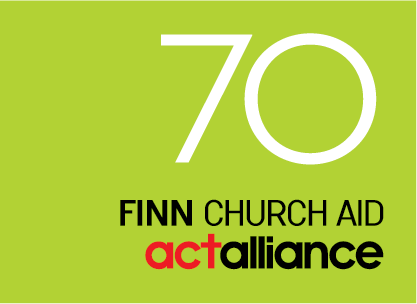 Our 70th anniversary is commemorated in various ways during the year. We begin with a modification of our website’s logo. The actual birthday is celebrated in September.
Our 70th anniversary is commemorated in various ways during the year. We begin with a modification of our website’s logo. The actual birthday is celebrated in September.
This is where it started. FCA was founded in 1947, although its name only goes back to 1965. That’s when the Lutheran Church in Finland took part in founding the Lutheran World Federation. Finland was in tatters after years of war, and FCA was the recipient of aid from countries supporting the reconstruction. The picture shows the signing of the Lutheran World Federation’s founding documents in Lund, Sweden.
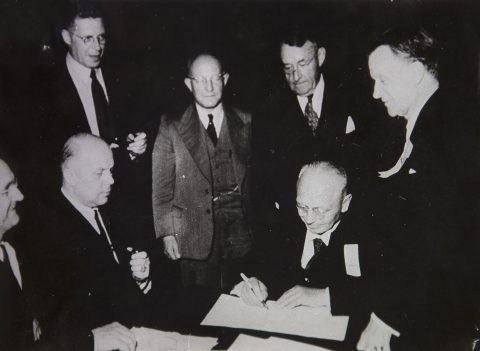
Photo: LWB Photo
Aiding Biafra and Vietnam. FCA arranged its first aid Come and help campaign in the mid-1960’s in support of Biafra (today’s Nigeria) and Vietnam, as well as the victims of the earthquake in Peru and the famine in Ethiopia. The picture is from the delivery of food aid to Biafra.
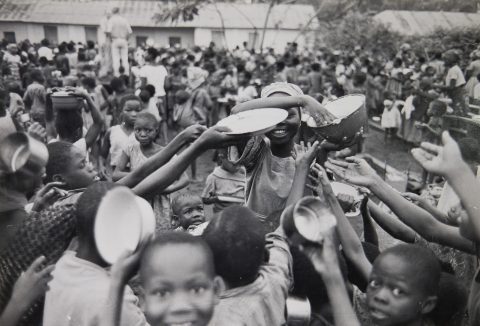
Photo: LWF National Committee in Finland
Celebrities get involved. In 1970, Pippi Longstocking (Inger Nilsson) participated twice in children’s parties in Helsinki, collecting money for undernourished children in Nigeria. The campaign resulted in a total of 45 000 mark.
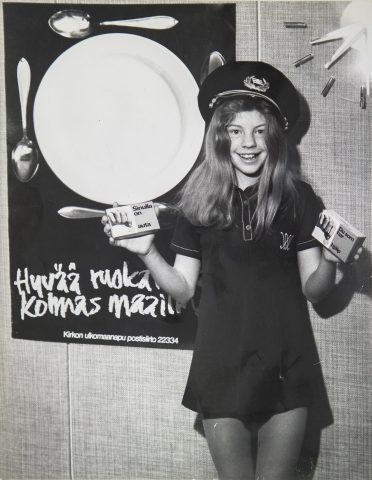
Photo: FCA
Kosovo in our minds. FCA helped Jugoslavian war victims in Kosovo as a part of the reconstruction of Mitrovica. Finnish engineers also participated in the project.

Photo: Martti Lintunen
Focus on fragile states. In 2016, FCA’s budget was around 40 million euros, and its work focuses on the most vulnerable people in about 15 countries. We work for everyone’s right to peace, quality education and sustainable livelihoods.
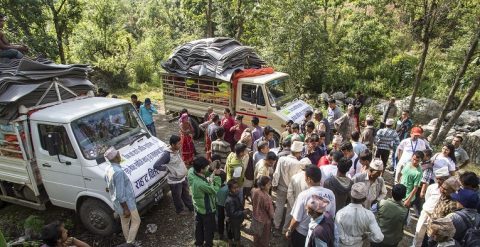
Food aid arrives to the village of Bukhel, Nepal in the aftermath of the earthquake in 2015. Photo: Antti Helin
Helsinki, Finland — Experts from around the world will gather this week at the ‘Responding to crises’ conference in Helsinki. The main goal of the event is to strengthen international responses by improving knowledge about current, unexpected, and future crises — ranging from large numbers of refugees to economic shocks to natural disasters.
The event, held 23-24 September, also aims to provide a forum for knowledge-sharing and vigorous debate, part of UNU-WIDER’s core mission to promote sustainable and equitable development for all.
‘The global community needs to get the facts right to ensure that we provide effective and efficient responses to crises. Our conference is an important step towards building a common understanding of the challenges being faced and how they can be addressed, while keeping in mind that each crisis is unique. One of the key ways in which we are doing this is by engaging development partners at all levels’, says Finn Tarp, Director of UNU-WIDER.
Conference brings together world-class experts
Among the diverse group of speakers is Elisabeth Rehn, a former Minister of Defence of Finland. She will deliver a keynote address on Friday morning, touching on the importance of inclusive responses and the role of women in their delivery. Other notable speakers at the two-day event include David Crawford of Oxfam, who will talk about valuable lessons learned in humanitarian response, and Blandina Kilama, a researcher with the Tanzanian think tank REPOA, who will speak on hunger and food security.
The conference programme features a variety of topics, including the economic and social impacts of crises, as well as the resources required to address them. Special sessions have also been organized on refugees and integration, as well as migration governance — timely themes given the UN Summit for Refugees and Migrants earlier this week in New York.
About UNU-WIDER
The United Nations University World Institute for Development Economics Research (UNU-WIDER) began operations over three decades ago in Helsinki, Finland, as the first research centre of the United Nations University. Today it is a unique blend of think tank, research institute, and UN agency — providing a range of services from policy advice to governments to high-quality freely available original research.
Access to Quality Education in Responding to Crises
The right to education is most at risk during emergencies but it is also the exact time when it is needed the most. Conflict is a major barrier to education. Globally 63 million out-of-school children and youth live in conflict-affected areas.
As part of the conference, Finn Church Aid (FCA) is organising a panel discussion tackling challenges in Education in Emergencies. Experts in this panel will especially focus on need of innovative solutions for quality learning for children and youth on the move. This session also discusses the need of joining up governments and humanitarian and development actors to deliver a more collaborative and rapid response to meet the educational needs of children and youth affected by crises.
Chair: Dean Brooks (Inter-Agency Network for Education in Emergencies)
Panelists: Aboubakar Moukadas-Noure (Minister of Education, Central African Republic), Rana Abdullah Ahmed (Iraq), Johanna Kurki (FCA)
Contact details
For press inquiries, please contact Annett Victorero, Communications Coordinator, UNU-WIDER
For inquiries about FCA’s panel session and work, plase contact Minna Elo, Communication Officer, FCA
minna.elo(at)kua.fi, tel. +358 50 3309747






 Our 70th anniversary is commemorated in various ways during the year. We begin with a modification of our website’s logo. The actual birthday is celebrated in September.
Our 70th anniversary is commemorated in various ways during the year. We begin with a modification of our website’s logo. The actual birthday is celebrated in September.



